
The 10th Tokyo-Beijing Forum ended its two-day session in Tokyo on Sept. 29 after adopting a statement called the "Tokyo Consensus," which pledged renewed efforts to mend the soured bilateral ties between Japan and China on the strength of "private-sector dialogue."
Noting that the current bilateral relationship is the worst since the normalization of diplomatic relations (in 1972), the joint statement said: "Geographically very close to each other, both countries not only share many common interests but also grave international responsibilities that cannot be averted."
"If such should be the case, it should be the best and sole alternative for both countries to maintain peaceful coexistence, and long-term friendship," the statement reads.
Describing the annual forum, which has just marked the 10th anniversary of its launch, "as an important mechanism for Japan-China private-sector dialogue," the statement said that it was agreed (among the parties concerned in both countries) to keep the platform of the Tokyo-Beijing Forum intact for another 10 years, starting next year.
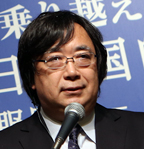 Yasushi Kudo, president of The Genron NPO, who initiated the forum 10 years ago, said that the decade-long experience of the forum has not produced the desired results in terms of deeper understanding between the two neighboring countries, as shown by the current state of their overall relations.
Yasushi Kudo, president of The Genron NPO, who initiated the forum 10 years ago, said that the decade-long experience of the forum has not produced the desired results in terms of deeper understanding between the two neighboring countries, as shown by the current state of their overall relations.
Nonetheless, this tiny venue of dialogue has been able to survive the severe political difficulties facing the two countries for the past 10 years due to the presence of people in both countries who are dedicated to pursuing peace and friendship, he recalled.
In his closing remarks at the end of the second-day plenary session, Kudo said he is determined to expand the scope of the platform for bilateral dialogue into one, engaging more countries in the Asia-Pacific region in the future.
The plenary and closing session began with a keynote report by Toshiro Mutoh, chairman of the board at Daiwa Institute of Research Ltd. and a former deputy governor of the Bank of Japan. Wang Ganyi, deputy director of the China International Publishing Group, served as moderator.
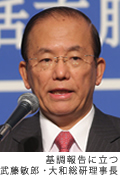 Mutoh said that the Tokyo-Beijing Forum should be managed in the coming 10 years from approaches and agendas quite different from those of the past 10 years.
Mutoh said that the Tokyo-Beijing Forum should be managed in the coming 10 years from approaches and agendas quite different from those of the past 10 years.
Japan and China share similar economic challenges, such as structural reforms, aging populations, new growth patterns, and therefore, there will be many areas and tasks that could be addressed jointly by both countries, he said.
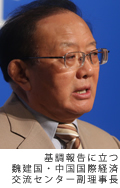 Wei Jianguo, vice chairman of the China Center for International Economic Exchange, said that in the coming 10 to 15 years, the Chinese economy and society will undergo changes of unprecedented proportions as the country pursues a shift from infrastructure- and investment-oriented growth to growth sustained by personal consumption.
Wei Jianguo, vice chairman of the China Center for International Economic Exchange, said that in the coming 10 to 15 years, the Chinese economy and society will undergo changes of unprecedented proportions as the country pursues a shift from infrastructure- and investment-oriented growth to growth sustained by personal consumption.
Given the challenges such as liberalization of financial services, combating air and water pollution, and the use of clean energy resources, China must learn from Japan's success and failures, and needs Japan's assistance, Wei said.
He thus detailed some specific projects that he said should be pursued by both countries in the future. They are combating air pollution in Beijing, the fight against water pollution at Lake Tai, and its neighboring rivers and lakes near Shanghai, the most famous area of origin for Chinese mitten crabs, collaboration in technological development (in particular, electric cars) and financial services, cooperation in the IT (information and technology) area, and marine and tourism development.
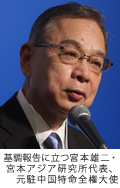 Yuji Miyamoto, chairman, Miyamoto Institute of Asian Research, and a former Japanese ambassador to China, in his keynote report, said he foresaw turbulent days in the coming 10 years for Japan and China. "This is because both countries are undergoing dramatic changes in many ways, so is the entire world," he explained.
Yuji Miyamoto, chairman, Miyamoto Institute of Asian Research, and a former Japanese ambassador to China, in his keynote report, said he foresaw turbulent days in the coming 10 years for Japan and China. "This is because both countries are undergoing dramatic changes in many ways, so is the entire world," he explained.
"It is formidable to predict the shape of both countries and their bilateral relations 10 years ahead. However, we should fully utilize the strength of a private-sector platform, that is, free-thinking, displays of creativity and bold moves that governments dare not attempt," Miyamoto said.
inline;">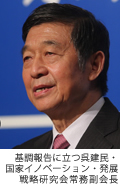 The fourth and final keynote report came from Wu Jianmin, executive vice chairman of the China Institute for Innovation and Development Strategy. Wu welcomed the consensus reached at the political dialogue session the previous day to the effect that any political confrontation should not adversely affect personnel exchanges between China and Japan, especially exchanges of younger generations.
The fourth and final keynote report came from Wu Jianmin, executive vice chairman of the China Institute for Innovation and Development Strategy. Wu welcomed the consensus reached at the political dialogue session the previous day to the effect that any political confrontation should not adversely affect personnel exchanges between China and Japan, especially exchanges of younger generations.
Wu reiterated many of his colleagues' assertions that the four key political documents, or the three joint statements, and the peace and friendship treaty signed by the governments of both countries since 1972, should serve as the basis for coexistence and the co-prosperity of both countries.
The plenary session drew to a close after hearing the brief reports by the moderators of the four sub-sessions, each on political dialogue, economic issues, security issues and media-related issues. (END)
Post a comment